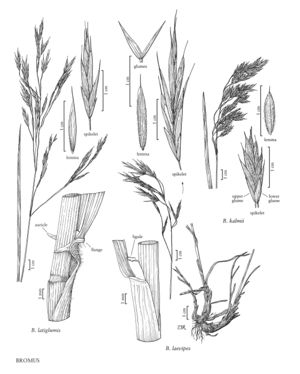Difference between revisions of "Bromus kalmii"
FNA>Volume Importer |
imported>Volume Importer |
||
| (7 intermediate revisions by 2 users not shown) | |||
| Line 4: | Line 4: | ||
|publications= | |publications= | ||
|common_names=Kalm's brome;Brome de kalm | |common_names=Kalm's brome;Brome de kalm | ||
| + | |special_status={{Treatment/ID/Special_status | ||
| + | |code=E | ||
| + | |label=Endemic | ||
| + | }} | ||
|basionyms= | |basionyms= | ||
|synonyms= | |synonyms= | ||
| Line 16: | Line 20: | ||
-->{{Treatment/Body | -->{{Treatment/Body | ||
| − | |distribution=Conn.;N.J.;N.Y.;W.Va.;D.C;Wis.;Iowa;N.H.;N.Dak.;Pa.;Va.;Vt.;Ill.;Ind.;Man.;Ont.;Que.;Maine;Md.;Mass.;Ohio;Minn.;Mich.;S.Dak. | + | |distribution=Conn.;N.J.;N.Y.;W.Va.;D.C.;Wis.;Iowa;N.H.;N.Dak.;Pa.;Va.;Vt.;Ill.;Ind.;Man.;Ont.;Que.;Maine;Md.;Mass.;Ohio;Minn.;Mich.;S.Dak. |
|discussion=<p><i>Bromus kalmii</i> grows in sandy, gravelly, or limestone soils in open woods and calcareous fens. Its range centers in the north-central and northeastern United States and adjacent Canadian provinces.</p> | |discussion=<p><i>Bromus kalmii</i> grows in sandy, gravelly, or limestone soils in open woods and calcareous fens. Its range centers in the north-central and northeastern United States and adjacent Canadian provinces.</p> | ||
|tables= | |tables= | ||
| Line 26: | Line 30: | ||
-->{{#Taxon: | -->{{#Taxon: | ||
name=Bromus kalmii | name=Bromus kalmii | ||
| − | |||
|authority=A. Gray | |authority=A. Gray | ||
|rank=species | |rank=species | ||
| Line 33: | Line 36: | ||
|basionyms= | |basionyms= | ||
|family=Poaceae | |family=Poaceae | ||
| − | |distribution=Conn.;N.J.;N.Y.;W.Va.;D.C;Wis.;Iowa;N.H.;N.Dak.;Pa.;Va.;Vt.;Ill.;Ind.;Man.;Ont.;Que.;Maine;Md.;Mass.;Ohio;Minn.;Mich.;S.Dak. | + | |illustrator=Cindy Roché |
| + | |illustration copyright=Utah State University | ||
| + | |distribution=Conn.;N.J.;N.Y.;W.Va.;D.C.;Wis.;Iowa;N.H.;N.Dak.;Pa.;Va.;Vt.;Ill.;Ind.;Man.;Ont.;Que.;Maine;Md.;Mass.;Ohio;Minn.;Mich.;S.Dak. | ||
|reference=None | |reference=None | ||
|publication title= | |publication title= | ||
|publication year= | |publication year= | ||
| − | |special status= | + | |special status=Endemic |
| − | |source xml=https:// | + | |source xml=https://bitbucket.org/aafc-mbb/fna-data-curation/src/200273ad09963decb8fc72550212de541d86569d/coarse_grained_fna_xml/V24/V24_292.xml |
|subfamily=Poaceae subfam. Pooideae | |subfamily=Poaceae subfam. Pooideae | ||
|tribe=Poaceae tribe Bromeae | |tribe=Poaceae tribe Bromeae | ||
Latest revision as of 16:22, 11 May 2021
Plants perennial; not rhizomatous. Culms 50-100(110) cm, usually erect, sometimes decumbent at the base; nodes 3-5, pubescent, puberulent, or glabrous; internodes puberulent or glabrous. Sheaths and throats pilose or glabrous; auricles absent; ligules 0.5-1 mm, glabrous, truncate, erose; blades 10-17 cm long, 5-10 mm wide, flat, with prow-shaped tips, both surfaces glabrous or pilose or only the adaxial surfaces pilose. Panicles 8-13 cm, open, drooping; branches ascending to spreading, flexuous. Spikelets 15-25 mm, elliptic to lanceolate, terete to moderately laterally compressed, with 7-11 florets. Glumes pubescent, margins often hyaline; lower glumes 5-7.5 mm, 3-veined; upper glumes 6.5-8.5 mm, 5-veined; lemmas 7-11 mm, elliptic to lanceolate, rounded over the midvein, backs more or less uniformly pilose or pubescent, margins densely long-pilose, apices acute to obtuse, entire; awns 1.5-3 mm, straight, arising less than 1.5 mm below the lemma apices; anthers 1.5-2.5 mm. 2n = 14.
Distribution
Conn., N.J., N.Y., W.Va., D.C., Wis., Iowa, N.H., N.Dak., Pa., Va., Vt., Ill., Ind., Man., Ont., Que., Maine, Md., Mass., Ohio, Minn., Mich., S.Dak.
Discussion
Bromus kalmii grows in sandy, gravelly, or limestone soils in open woods and calcareous fens. Its range centers in the north-central and northeastern United States and adjacent Canadian provinces.
Selected References
None.
